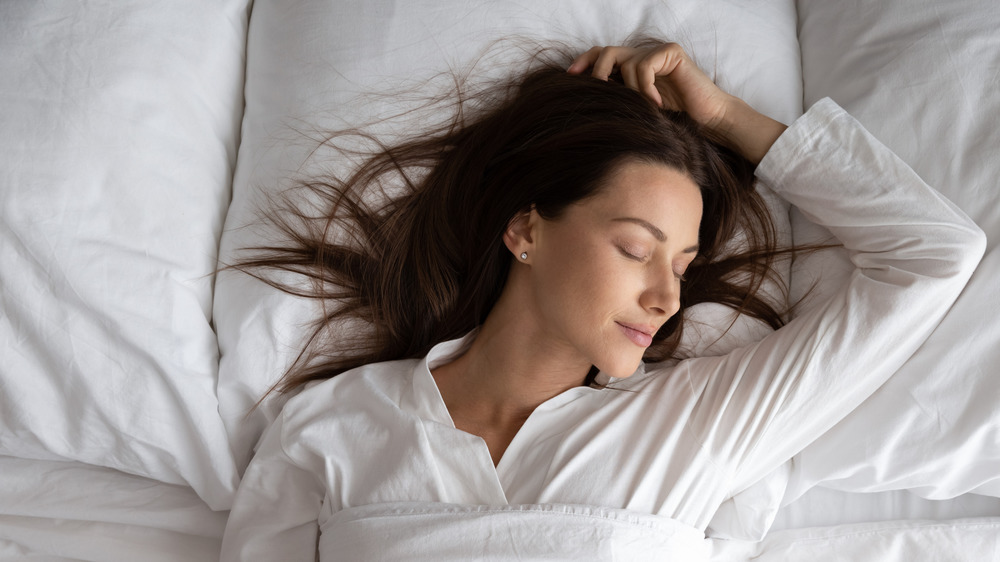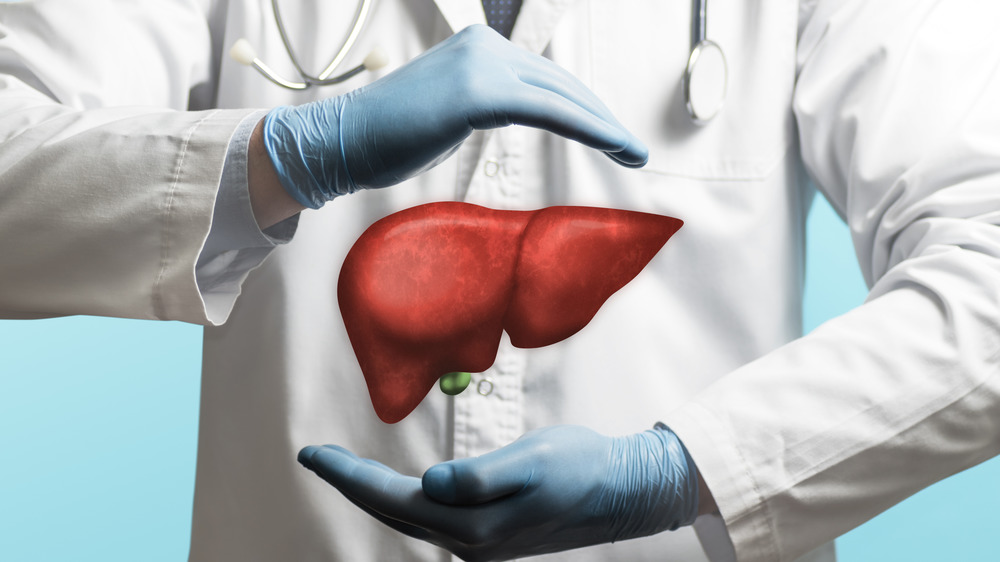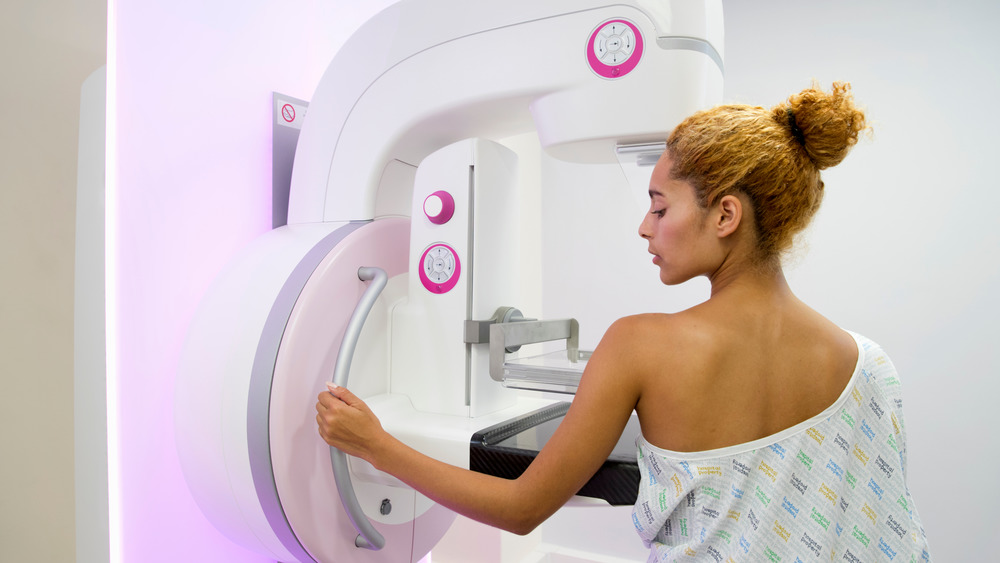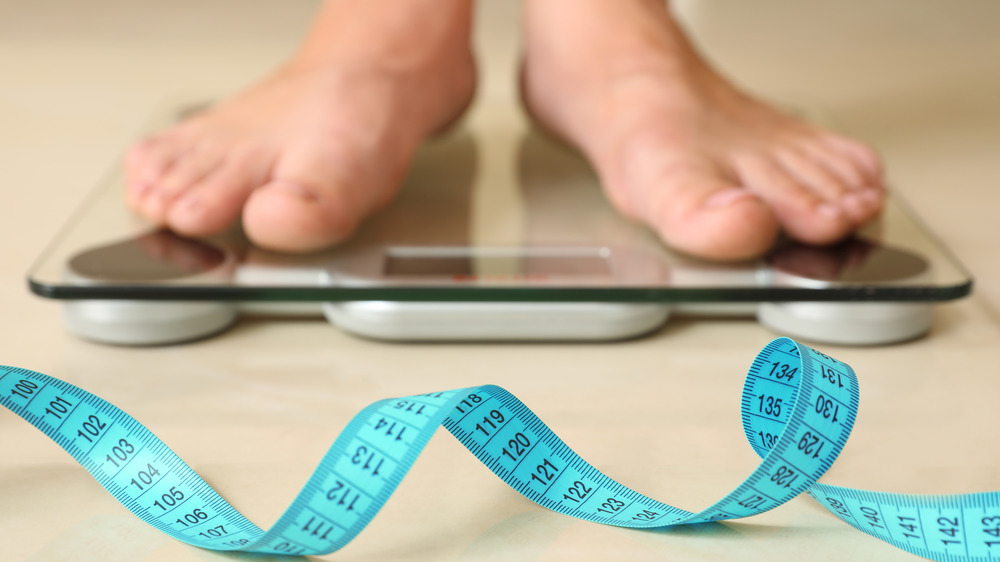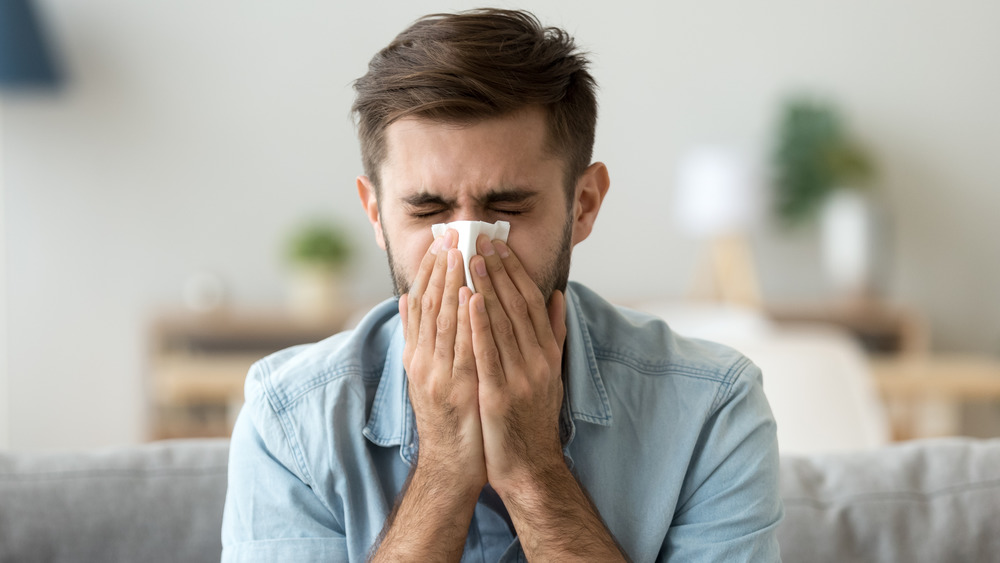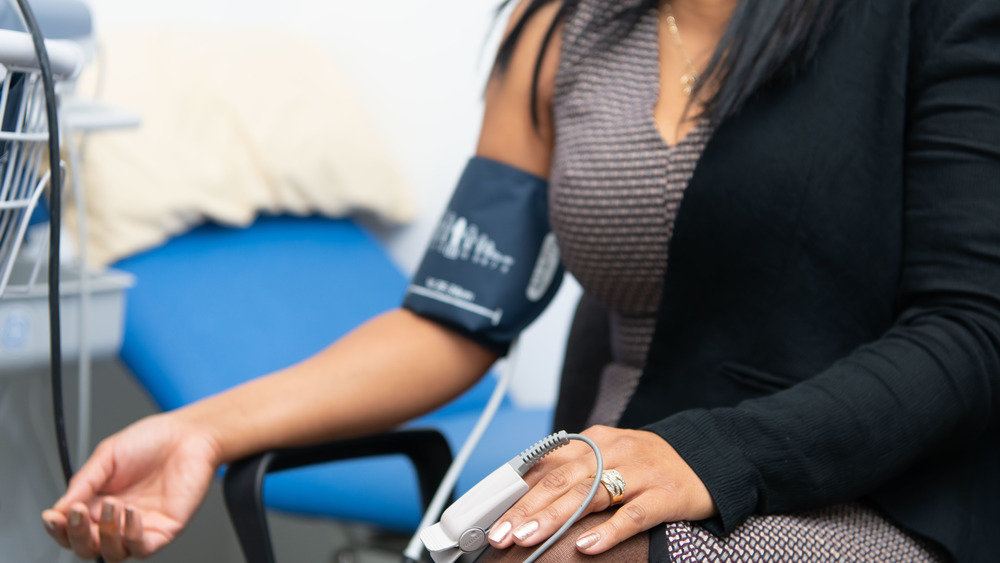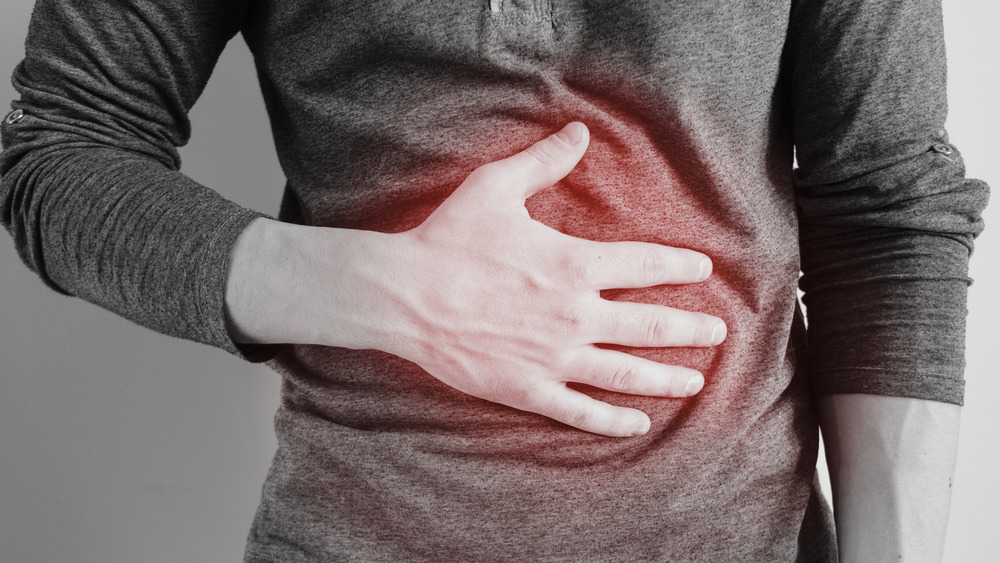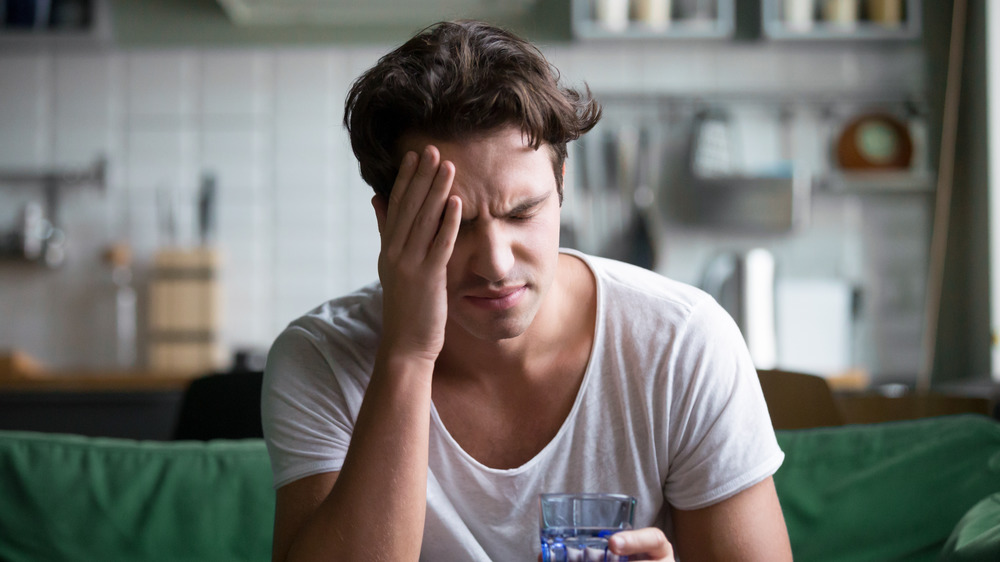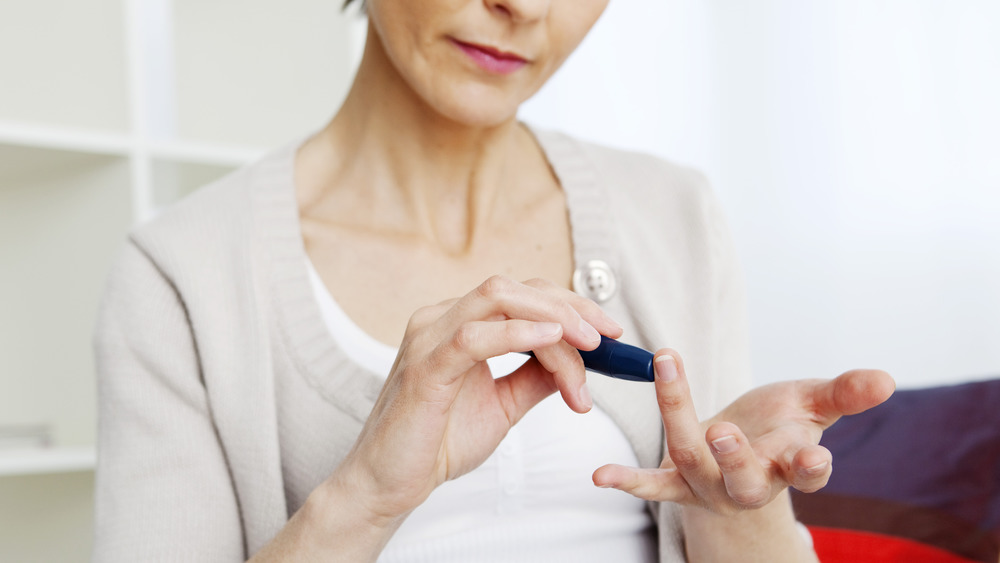When You Stop Drinking Alcohol, This Is What Happens To Your Body
We may receive a commission on purchases made from links.
If you've turned to alcohol to cope with the stress of the "new normal" in 2020, you're not alone. Alcohol consumption has increased by 14 percent compared with a year ago, including a 17 percent increase for women, according to a report in JAMA Network Open. What's more, there has been a 41 percent rise in heavy drinking (or four or more drinks within two hours) among women during this same time frame. Bear in mind that one standard drink is about 14 grams of alcohol or 12 ounces of regular beer, 5 ounces of wine and 1.5 ounces of distilled spirits, according to the National Institute on Alcohol Abuse and Alcoholism.
Although some research points to health benefits associated with moderate alcohol intake (no more than two drinks a day for men and no more than one drink for women), overdoing it can wreak havoc on your body. Here's what happens to your body and life if you stop drinking alcohol. Spoiler: It's kind of awesome.
You will sleep better when you give up alcohol
Alcohol may help you drift off to sleep quicker, but you won't stay asleep for long, according to the National Sleep Foundation. And the more you drink, the worse your z's. Consuming fewer than two servings of alcohol per day for men or one serving per day for women decreased sleep quality by 9.3 percent, a 2018 study published in the Journal of Medical Internet Research – International Scientific Journal for Medical Research. By contrast, more than two alcoholic beverages per day for men or one for women decreased sleep quality by 39.2 percent.
"Many people use alcohol to fall asleep, but it doesn't help maintain sleep," Dr. Dean Drosnes, addiction specialist and medical director of the Pennsylvania campus of Caron Treatment Centers, an addiction rehabilitation program, told Health Digest. "It interferes with good restorative sleep," he continued. "When you quit drinking, you may initially find it difficult to fall asleep, but it will quickly get better and you will start to get more restorative sleep and more refreshing sleep."
Your heart will be healthier when you stop drinking alcohol
There may be some heart health benefits to moderate alcohol consumption, but drinking too much alcohol increases your risk for high blood pressure and stroke, the American Heart Association noted. "Quitting alcohol can begin to improve heart health in as early as a few weeks," Roopali Parikh, a psychiatrist specializing in substance use disorder at Northwell Health Physician Partners' Behavioral Health Group Practice in Manhasset, New York, told Health Digest. "Alcohol cessation can lead to improvements in blood pressure, a reduction in dangerous blood fats called triglycerides, and decreased chances for congestive heart failure and/or abnormal heart rhythms or arrhythmias."
Alcohol increases your heart rate and can lead to "holiday heart syndrome" or irregular heartbeats, namely atrial fibrillation (or AFib), in the 24 to 48 hours after you drink. This phenomenon was first noticed in emergency rooms after New Year's Eve, a night known for excessive alcohol consumption. AFib is associated with a five-times greater risk for stroke, the American Stroke Association pointed out.
Your liver gets a break once you stop drinking alcohol
A detox organ, your liver is charged with breaking down alcohol so it can be removed from your body. Some of the byproducts of this process can trigger inflammation and injure liver cells, according to the American Liver Foundation. If you drink more alcohol than the liver can process, the imbalance can injure the liver by interfering with the normal breakdown of protein, fats, and carbohydrates.
Alcohol-related liver disease is caused by drinking too much alcohol and is largely preventable. The three main types of liver disease associated with alcohol are fatty liver, alcohol-related hepatitis, and alcohol-related cirrhosis. Fatty liver is marked by an excessive amount of fat inside liver cells that make it harder for the liver to do its job, and alcohol-related hepatitis is an in inflammation of the liver and destruction of liver cells. As many as 35 percent of heavy drinkers develop alcohol-related hepatitis. Lastly, alcohol-related cirrhosis, or liver scarring, is the most serious type of alcohol-related liver disease. But "liver health can also improve over time with quitting alcohol," addiction psychiatrist Roopali Parikh told Health Digest.The liver is capable or amazing things and can repair and regenerate when given a chance.
When you quit drinking, your risk for certain cancers lowers
Drinking too much alcohol increases the risk for many cancers. This list includes cancers of the mouth, throat, liver, colon, breast, and more, according to the American Cancer Society. In fact, alcohol use accounts for about 6 percent of all cancers and 4 percent of all cancer deaths in the United States. And the more alcohol you consume, the higher your risk for these cancers.
Exactly how alcohol affects cancer risk differs by cancer type. Alcohol can increase levels of the female sex hormone estrogen and other hormones associated with hormone-receptor-positive breast cancer. Alcohol also may increase breast cancer risk by damaging genetic material in cells. Women who have three alcoholic drinks per week have a 15 percent higher risk of breast cancer when compared with teetotalers, explained Breastcancer.org.
Quitting or cutting back on alcohol helps to lower these risks. Regular, heavy alcohol damages the liver, causing inflammation and scarring that may set the stage for liver cancer. But "data has suggested that the risk of liver cancer falls after alcohol cessation by 6 percent to 7 percent per year," addiction specialist and psychiatrist Roopali Parikh told Health Digest.
You may start to look younger when you quit drinking alcohol
Alcohol causes dehydration that results in a dry, dull skin tone, Dr. Anthony Youn, Michigan–based plastic surgeon and author of The Age Fix: A Leading Plastic Surgeon Reveals How to Really Look 10 Years Younger, told Health Digest. When you skin is dehydrated, wrinkles and enlarged pores become more visible, he explained.
A study in the Journal of Clinical and Aesthetic Dermatology found that drinking eight or more alcoholic beverages a week may increase our chances of developing wrinkles on your upper face, under-eye puffiness, marionette lines at the corners of your mouth, volume loss in your cheeks and mid-face, plus more visible blood vessels. These are all signs of aging.
"You may see your skin feel suppler and more hydrated after removing alcohol from your diet," according to Youn. "Alcohol can also create inflammation in the skin, as evidenced by some people who suffer rosacea outbreaks with alcohol use." Often marked by ruddy cheeks and facial flushing, rosacea is an inflammatory skin condition that comes and goes and can have effects on one's quality of life. "You may find your skin looks clearer and even more youthful after discontinuing alcohol," said Youn.
You may lose weight when you give up alcohol
Alcohol has empty calories, Dana Greene, a registered dietitian based in Brookline, Massachusetts, told Health Digest. A 12-ounce craft beer may have as many as 350 calories, while 5 ounces of pinot grigio contains 128 calories. "Mixed drinks are often calorie bombs because of all the added sugar," Greene explained. "Besides the sometimes high caloric content, alcohol also reduces inhibitions and may make you more likely to eat things that aren't normally part of a healthy diet, including high-fat foods."
Moderate drinkers consume more calories and are 24 percent more likely to order something savory and high in fat, like fries, according to a study published in Appetite. Cutting back on or quitting alcohol will undoubtedly lead to weight loss, according to Greene. "You will make healthier choices in the moment, and when you give up drinking, you also feel better and will have more energy throughout the day to exercise, which will improve upon your weight loss efforts."
You will be sharper and happier after giving up alcohol
Alcohol has many effects on your brain, Dr. Dean Drosnes, addiction specialist and medical director of the Pennsylvania campus of Caron Treatment Centers, told Health Digest. The brain's prefrontal cortex, which controls thinking and choosing, functions better when there is no alcohol in your system. You may notice that you can remember a phone number that you couldn't a few weeks ago when you give up drinking, the specialist continued. "Your brain is working better and you will be able to think more clearly when you stop drinking," said Dorsnes. "You also don't wake up in a fog or with a headache, so you are much sharper without the influence of alcohol."
Spirits and other types of alcohol may boost your own spirits in the moment, but alcohol is a depressant. Conversely, research in the Canadian Medical Association Journal demonstrated that quitting alcohol may boost your mental health, especially among women who are moderate drinkers. "Alcohol affects gamma-Aminobutyric acid, or GABA, a depressant neurotransmitter that slows things down," Dr. Drosnes explained. Alcohol abuse and alcoholism can worsen existing depression. If you are depressed or have an anxiety disorder that alcohol was masking, however, you may need to seek professional help, according to Drosnes.
When you stop drinking alcohol, you will be less accident-prone
Alcohol affects the brain's cerebellum, which is the balance center. "When you are drunk, you can't keep balance," Dr. Dean Drosnes, addiction specialist and medical director of the Pennsylvania campus of Caron Treatment Centers, put it simply when speaking with Health Digest. Furthermore, people who drink are at a greater risk of dying from injury as well as sustaining nonfatal injuries, and this includes moderate drinkers too. "Even casual drinking has mild effects on the cerebellum, but when you stop drinking, your cerebellum returns to normal and you may even notice you are walking more briskly than you used to walk," Drosnes confirmed.
Each and every day, 29 people in the United States die in motor vehicle crashes involving a drunk driver, according to the Centers for Disease Control and Prevention. Drinking affects your reflexes and impairs your judgement, setting the stage for a potentially fatal car accident if you are behind the wheel. The more you consume, the greater the effects on your driving, but according to American College of Surgeons, these dangerous effects can be seen with a blood alcohol concentration of 0.05 — below the legal limit.
Your interpersonal relationships will improve after you quit drinking alcohol
You may be less likely to fight with your partner or loved ones if you are not intoxicated, Dr. Dean Drosnes, addiction specialist and medical director of the Pennsylvania campus of Caron Treatment Centers, told Health Digest. "Your brain's prefrontal cortex is its filter which says 'maybe I shouldn't say this' or 'maybe I should say it in a less assertive manner,'" he explained. "With alcohol onboard, you are prone to say things you shouldn't because your filter is not working as well as it should be." While giving up alcohol won't automatically turn a bad relationship into a good one, it will cut down on many booze-fueled arguments.
If you do decide to stop drinking, you should first come up witha. plan. "While alcohol use disorder is associated with adverse effects on multiple organs over time, it is important to note that abrupt cessation of alcohol (i.e. stopping cold turkey) can lead to fatal medical conditions," Dr. Roopali Parikh, a psychiatrist specializing in substance use disorder at Northwell Health Physician Partners' Behavioral Health Group Practice in Manhasset, New York, told Health Digest. Instead, she recommended speaking with a health care provider to determine the best way to begin.
Your immune system will be stronger once you stop drinking alcohol
Your immune system is charged with protecting your body from viruses and other threats. The World Health Organization has warned that alcohol consumption may put people at increased risk of contracting and spreading the novel coronavirus (via USA Today). "Alcohol, especially regular ongoing use, acts as an immune system suppressant, and your immune system is what fights off not only Covid-19, but the flu, winter colds, and strep throat," Dr. Dean Drosnes, addiction specialist and medical director of the Pennsylvania campus of Caron Treatment Centers, told Health Digest.
What's more, you may be more likely to develop complications after surgery and will take longer to recover from an illness if you consume excessive amounts of alcohol, compared with your counterparts who drink less. Alcohol also reduces your inhibitions, which may make you more likely to exercise poor judgment and engage in risky behaviors including unprotected sex or sex with multiple partners, according to the CDC. These behaviors can result in unplanned pregnancy or sexually transmitted diseases.
When you stop drinking alcohol, your blood pressure will go down
Untreated high blood pressure is a major risk factor for heart attack and stroke, and quitting alcohol or drinking moderately may help keep your numbers where they need to be, the American Heart Association stated. Blood pressure of less than 120 mm Hg systolic (upper) — the pressure when the heart beats while pumping blood — and less than 80 mm Hg diastolic (lower) — the pressure when the heart is at rest between beats — is considered normal.
A study in the July 2020 Cochrane Database of Systematic Reviews found that one glass of alcohol had little to no effect on blood pressure, while drinking two or more standard drinks decreased blood pressure and this effect lasted for up to 12 hours. After that, however, blood pressure started to rise, the study found. The more alcohol you consume, the more dramatic this effect on blood pressure, the study authors concluded.
You will have less heartburn and fewer stomach woes after giving up alcohol
Alcohol makes your stomach churn more acid than it usually does, which can cause inflammation of the stomach lining and lead to stomach pain, vomiting, and diarrhea. "Alcohol is an irritant to the gastrointestinal system and can cause bloating, belching, nausea, stomach pain, and gastroesophageal reflux disease (GERD)," Dr. Dean Drosnes, addiction specialist and medical director of the Pennsylvania campus of Caron Treatment Centers, told Health Digest.
With GERD, acid from your stomach comes up into your esophagus, causing fiery pain in your chest (aka heartburn). Alcohol is also a trigger for indigestion, which is characterized a painful fullness and heat, burning or pain between your belly button and lower breastbone, the American Gastroenterological Association explained. Indigestion (aka dyspepsia) is not the same thing as heartburn or GERD, however. The bottom line? "Your gastrointestinal system will thank you for not drinking alcohol," said Drosnes. And these changes will begin to occur quickly once you stop drinking.
Quit the alcohol and you'll never have to deal with a hangover again
Not everyone gets hangovers, but if you are one of the unfortunate ones who feels tired, thirsty, nauseated, dizzy, and has a bad headache after a bender, you will feel better and brighter in the mornings once you stop drinking alcohol, according to Dr. Dean Drosnes, addiction specialist and medical director of the Pennsylvania campus of Caron Treatment Centers.
Hangover symptoms are greatest when your blood alcohol concentration returns to about zero, and these hangover symptoms can last a day or longer, the National Institute on Alcohol Abuse and Alcoholism explained. Besides feeling under the weather, a hangover can impair your attention, decision-making abilities, and muscle coordination, including your ability to drive, do your job, operate machinery, or care for others.
"There is no question that stopping drinking eliminates hangovers for those who are prone to them," Dr. Drosnes told Health Digest. You will see the difference in how you feel in the mornings soon after you stop drinking.
You may reverse your prediabetes by giving up alcohol
Blood sugar or glucose levels fluctuate when you consume alcohol, Dr. Dean Drosnes, addiction specialist and medical director of the Pennsylvania campus of Caron Treatment Centers, told Health Digest. "If you go to the doctor for a routine blood test and your blood sugar is higher than it should be, you may have prediabetes; and if you stop drinking, it will drop your blood sugar and you will no longer be in that category," he explained.
Prediabetes is a condition that occurs when your blood sugar levels are too high, but not quite high enough to be considered diabetes — yet. Prediabetes is defined as a fasting blood sugar of 100 milligrams per deciliter of blood (mg/dl) to 125 mg/dl. By contrast, diabetes is diagnosed by a fasting blood sugar that is greater than or equal to 126 mg/dl. Normal blood sugar is less than 100 mg/dl. Quitting alcohol can give you a head start against type 2 diabetes, the form of the disease most closely related to obesity and one that increases risk for heart disease.


